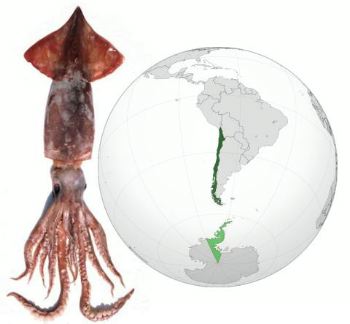|

This year for climatic reasons the giant squid will be captured in smaller quantities, at least by the artisanal sector
Industrialists warn of layoffs after deputies reject to postpone giant squid law
 CHILE
CHILE
Thursday, August 15, 2019, 06:00 (GMT + 9)
By a forceful majority of 118 votes, the Chamber of Deputies rejected the bill that would delay the entry into force of Jibia (giant squid) Law by two years, so it now should begin to take effect on Friday 16.
The law, which was passed six months ago, obliges to capture the resource with “poteras” (jiggers) or hand lines, excluding the drag mechanisms.
.jpg)
Jigging fishing vessel making a trial test of giant squid (Dosidicus gigas) fishing in neighboring waters of Perú. (Photo: Sea Sheperd)
Economy Minister, Juan Andrés Fontaine lamented the decision and admitted that they are evaluating insisting on the idea through the Senate, for which they require a larger quorum.
.jpg) "We regret the decision because we considered it sensible to extend for a while to allow the adaptation of all sectors before this law came into force," said the authority. "We regret the decision because we considered it sensible to extend for a while to allow the adaptation of all sectors before this law came into force," said the authority.
In fact, he added that at this moment the giant squid has moved away from the coasts, so it cannot be caught by artisanal fishers either.
”Leaving USD 150 million of exports of the resource at sea, with the consequent loss of employment, is not a responsible decision because it is not based on serious studies. Here employment and exports are being sacrificed when the economy is going through a difficult time. I expected sanity to prevail," Fontaine said.
Reactions
Once the decision was known, the Association of Fisheries Industrialists (Asipes) was emphatic in warning about the error that, in their opinion, would be made by rejecting the law came into force. "It is shocking to verify Parliament's spirit of seeking to correct the affairs of the fishing country by destroying industrial fishing," said the entity.
They added this will leave 1,700 families out of work, and that the solution proposed by the government to help them through a social platform does not work.
.jpg)
The processing of the giant squid has been a great generator of employment since the cutting and cleaning is done entirely manually (Photo: ASIPES)
“It is an unfeasible arrangement for these families. Remember that a worker on board has an approximate income of $ 1 million and a plant worker $ 650,000,” added Asipes.
Meanwhile, Fisheries Undersecretary Román Zelaya warned that Chile could lose catch participation before the Regional Fisheries Organization benefiting other countries intensive in this fishery such as China, South Korea and Peru.
.png) This, because annually this entity sets the quotas of various species through a technical scientific committee that takes into account the catch volumes of giant squid in the immediately preceding years, and Chile would not be fulfilling its granted volume of 200,000 tonnes. This, because annually this entity sets the quotas of various species through a technical scientific committee that takes into account the catch volumes of giant squid in the immediately preceding years, and Chile would not be fulfilling its granted volume of 200,000 tonnes.
"Already this year for climatic reasons the giant squid will be captured in smaller quantities, at least by the artisanal sector; and with the full application and validity of the law, it can be expected that the catch volumes will be lower. And in this way these indices will determine that the quotas that this committee will set will be lower,” the authority anticipated.
On the other hand, deputy Camila Rojas (FA) criticized the industry for "preferring the lobby and pressure" with layoffs, instead of going to the bottom of the issue.
"The share corresponding to the 20% industry was already captured in 2019," she said.
Author: Miriam Leiva /La Tercera
Related article.
- PacificBlu closes giant squid (jibia) processing plant
editorial@seafood.media
www.seafood.media
|
|



